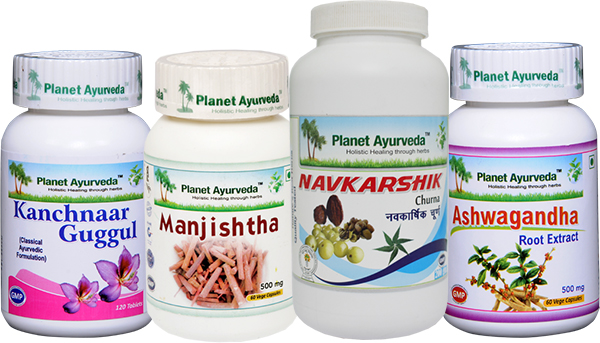Ayurvedic Treatment for Lymphoma in Dogs
Abstract
Ayurveda is perhaps the oldest system of holistic medicine, dating back to 6000 BC. The text books belonging to Ayurveda are written in sanskrit, which is one of the oldest recorded languages in the world. According to Ayurvedic texts, there are many medicines that have focused on animal health (pashu swasthya), treatment of disorders in animals, their management and even surgeries. In this article we will discuss particular formulations that have been used in lymphoma especially in the case of dogs. Also we will discuss lymphoma as a disease in dogs in detail.
Introduction
In the Rigveda from 2000-4000 BC, physicians have mentioned treatment for both humans and animals. Salihotra was the first to be credited as an animal healer when materia medica in veterinary medicine was written by him. The first veterinary hospital was opened by King Ashoka in 1463 BC and for the treatment botanicals were used. Ayurvedic herbs have been used for thousands of years and have proven their efficacy and safety. Thus Ayurvedic medication is very effective in managing and treating lymphoma in dogs as well as in humans. Lymphoma which is generally a cancerous growth of lymph nodes and lymphatic system. The cancer can be localized to one particular region or can metastasize to many other regions. Lymphatic systems basically include lymph nodes, organs like spleen, tonsils and lymphatic vessels. Now let us discuss lymphoma in detail.

Prevalence of lymphoma in dogs
Lymphoma is very common in dogs especially in middle aged dogs. It counts around 15%-20% of disorders occurring in dogs. Breeds like golden retrievers, boxer dogs, bullmastiffs, basset hounds, saint bernards, saint bernards, scotish terrier and even bulldogs are at a huge risk of developing lymphoma.
Types of lymphoma
Lymphoma in dogs are of four types
1. Multicentric lymphoma
Multicentric means when lymph nodes are affected throughout the body. This affects approximately 80-85% of dogs and is considered as the most common type of lymphoma.
2. Alimentary lymphoma
Alimentary is the term that describes the involvement of gastrointestinal tract and is the second most common type of lymphoma in dogs. In this type of lymphoma gastrointestinal lymph node involvement is commonly seen.
3. Mediastinal lymphoma
This type is the rarest form of lymphoma and involves the lymph nodes of the chest and other organs lying in the chest cavity.
4. Extranodal lymphoma
Extranodal name suggests a lymphoma that is not involving any of the lymph nodes throughout the body but is attacking an organ outside the lymphatic system. It is even rarer than mediastinal but can develop in skin, eyes, kidney, lung and nervous system.
Symptoms of lymphoma in dogs
1. Multicentric lymphoma
The first sign in this case is a swelling which can be noticed anywhere on your dog’s body. The swelling is mostly located in the chest, armpits, groin and even behind the knees. Other symptoms are not usually observed.
2. Alimentary lymphoma
In alimentary lymphoma clinical signs depend on the organ affected due to enlarged lymph nodules. These symptoms include vomiting, diarrhea, weight loss, fatigue, fever, abdominal cramps, bloating and pain in abdomen. Due to pain or indigestion your dog will frequently skip meals, will be very inactive and often make typical noises whether you are around or not.
3. Mediastinal lymphoma
These types of lymphoma are capable of creating lesions in lungs along with frequent inability to breathe. Coughing, excessive drooling or complete dryness of mouth are also absorbed. Your dog will show less interest in mobility because it may also cause chest pain in the chest. The Dog will seem lazy, responding less to commands and frequent disinterest in eating.
4. Extranodal lymphoma
Extranodal lymphoma can vary significantly and also depend on the organ involved. There can be involvement of more than one organ and multiple symptoms can be observed. But firstly the symptoms will appear according to the primary organ affected. Common symptoms are like fever, fatigue, laziness, disinterest in food, inactivity and not reacting to affection.
Stages of lymphoma
There are total 5 stages of lymphoma
- Stage 1: Involves only single lymph node
- Stage 2: Presence of lymph node on only one side of diaphragm
- Stage 3: General lymph node involvement
- Stage 4: Involvement of liver and spleen
- Stage 5: Involves deeper structures of body and higher unit of functioning (bone marrow, nervous system)
Diagnosis of lymphoma
Every swollen lump is not lymphoma. Enlarged lymph nodes can be the result of certain infections or some autoimmune diseases. So to make a clear diagnosis veterinarian has to perform some tests. Diagnostic tests usually done for lymphoma includes fine needle aspiration that involves aspirating fluid from lymph nodes and organs. In some cases removal of tissue cells is also done and then these are observed under a microscope. In some cases biopsy may also be recommended along with serum biochemistry.
Treatment
Usually chemotherapy is being guided to the Dogs with lymphoma.
According to Ayurveda
Ayurveda provides you with a lot of herbs that can prove beneficial for your dog, if suffering from lymphoma or common swelling of lymph nodes. Moreover it won’t create any harm to the health of your pet as it will not produce any side effects.
Herbal remedies for Lymphoma in dogs by Planet Ayurveda
Planet Ayurveda is an Herbal manufacturing unit which deals with the manufacturing of herbal products that can be used in various diseases involving both humans and animals.

Below are the products that you can use in lymphoma for your dog.
- Kanchnaar Guggul
- Ashwagandha capsules
- Manjishtha capsules
- Navkarshik Churna
Products Description
1. Kanchnaar guggul
Kanchnaar bark (Bauhinia variegata), amalaki (Emblica officinalis), haritaki (Terminalia Chebula), bibhitaki (Terminalia bellerica), black pepper (piper nigrum) and others are the ingredients of this formulation. This is a classical formulation mentioned in texts and is known to decrease the size of lymphoma. Kanchaar which is the main ingredient of this formulation is very effective in dissolving the swollen lump, reduce its size or make it stable at particular size.
Dose: Four tablets two times a day with meals.
2. Ashwagandha capsules
This formulation has standardised extract of ashwagandha (withania somnifera) which is very useful in enhancing immunity as well as providing boost to body metabolism. It reduces symptoms like fever, pain, fatigue and inactivity in your pets behaviour. Ashwagandha is known as the king of herbs and is very well known for its wonderful properties. It gives efficacious results in humans as well as in animals.
Dose: Two capsules twice a day with meals.
3. Manjishtha capsules
Manjishtha (Rubia cordifolia) is a very brilliant herb and has very impressive effects in many conditions. In this case it helps in providing a soothing effect to the body and decreases the intensity of symptoms. Manjishtha improves liver functioning along with raktashodhak i.e it acts as a blood purifier. It balances pitta and improves digestive fire.
Dose: Two capsules twice a day with meals.
4. Navkarshik Churna
Amalaki (Emblica officinalis), haritaki (Terminalia Chebula), bibhitaki (Terminalia bellerica), neem (Azadirachta indica), Giloy (Tinospora cordifolia) and many others. These all help in building great defense systems of the body in both humans as well as in animals and also aids in immune modulation. This formulation has been guided in charak samhita for blood purification as well as for removing toxins from the body by pacifying pitta.
Dose: One tsp twice a day with meals.
Contact Planet Ayurveda to provide you the costing / ordering and delivery information at – costing.planetayurveda@gmail.com or call at +91-172-5214030 Or Check Website – www.PlanetAyurveda.com
Conclusion
It is very important to understand that many disorders occurring in animals are also commonly noticed in humans too. But the difference is pets or animals can not express their pain verbally. It’s usually the owners who notice changes in their pets and then react. So one should stay alert whenever it is for the benefit of pets because you have pampered them and loved them the way you will love your children, being alert for their concern is a must.



